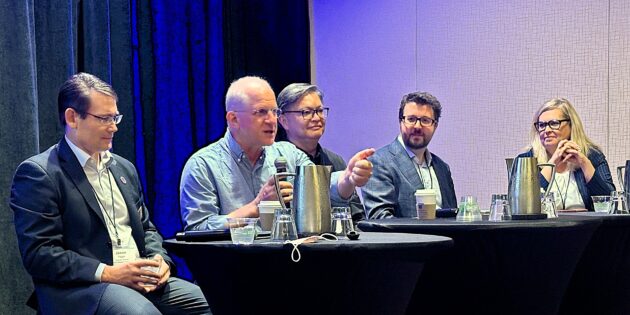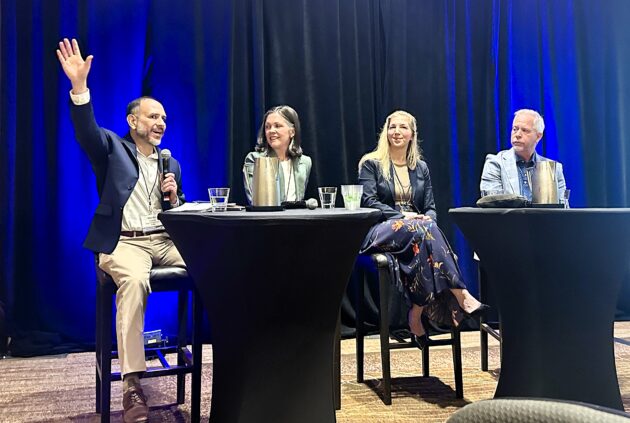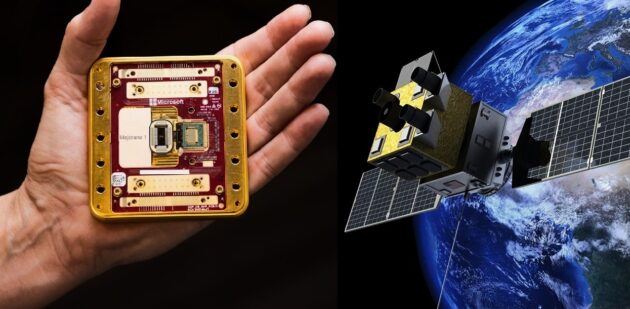BELLEVUE, Wash. — Quantum physics and outer space may seem as different as two tech frontiers can be, but the challenges facing Pacific Northwest ventures that are aiming to make their fortune on those frontiers are surprisingly similar.
Amid the current turbulence on the national political scene, it’s getting harder to capture the attention — and gain the support — of the federal government, which has historically been the leading funder of research and development. And that means it’s more important than ever for researchers, industry leaders and local officials to join forces.
“Think of it as a triad,” said Jason Yager, executive director of the Montana Photonics and Quantum Alliance, which is one of the beneficiaries of a $41 million Tech Hub grant awarded by the federal government a year ago. “If all of these pieces are working together, then where they meet is socio-economic growth, and then you’re ready to bring in the additional funding to launch that.”
Yager and other tech leaders from the northwest U.S. and western Canada compared notes today at the Hyatt Regency Bellevue during the Pacific Northwest Economic Region’s annual summit.
The topics covered at this week’s sessions included AI and aviation — tech frontiers in which the Pacific Northwest has had a longstanding leadership role, thanks to the likes of Boeing, Microsoft and Amazon. In contrast, the frontiers of space commerce and quantum information sciences are far less settled.
To be sure, there are grand aspirations. “We like to say we’re the Silicon Valley of space here in Puget Sound,” Sen. Maria Cantwell, D-Wash., said last year at the opening of Amazon’s Project Kuiper satellite factory in Kirkland, Wash. And a couple of years ago, regional tech leaders said Washington state has a chance to create a “Quantum Valley” modeled after Silicon Valley. But in both realms, other regions — ranging from California to Colorado to Chicago — are competing for attention.
“I’m tired of students getting admitted to Berkeley and University of Washington, and having them pick Berkeley,” said Charles Marcus, a UW professor who heads up a public-private consortium called the Northwest Quantum Nexus. “I want them to pick University of Washington. I want to be better than Berkeley. That’s going to take some concentration, but the rewards are big.”
The quantum perspective
One of the items on Marcus’ to-do list is to get the Northwest Quantum Nexus’ website back online.
The Nexus was established back in 2019 by UW, Microsoft and the Pacific Northwest National Laboratory to bring together researchers, developers and business leaders in the field of quantum computing.
While classical computers process binary bits that can only represent ones or zeroes, quantum computers work with qubits that can represent multiple values simultaneously until the results are read out. The technique — which makes use of superconducting circuits or trapped ions — can theoretically execute certain types of algorithms much faster than classical techniques can.
Researchers are closing in on the creation of quantum hardware that will be able to follow through on those theoretical promises. Last week, for example, a Danish consortium announced that it would host what it called the world’s most powerful quantum computer by the end of next year, with Microsoft providing the software.
Marcus and his colleagues acknowledge that they don’t yet know exactly what quantum computers will be capable of. “It’s kinda like you’re trying to predict what computers are going to do, pre-ENIAC, pre-vacuum tube, like getting into mechanical computers,” said John Gamble, senior director of architecture at IonQ. That company is headquartered in Maryland but opened a quantum computer factory in Bothell, Wash., last year.

This type of quantum uncertainty can make it difficult to catch the attention of funders and investors. But the Montana Photonics and Quantum Alliance has been meeting with success by focusing on workforce development.
Yager compared the strategy to what happened during the California Gold Rush in 1848. “There were some miners who struck it rich and became millionaires,” he said. “There were some who made a living. There were some who lost their shirts. But there were others who did really well, and those were the ones in the supply chain. We still see Wells Fargo today. There’s Levi’s being worn here in the room that came out of that gold rush, that supply chain.”
Similarly, the skills required for quantum development can be applied to other tech fields. In Montana, the graduates of Gallatin College’s photonics and laser technology program have gone on to successful careers in communications, defense, homeland security, medical devices and information technology.
Looking more broadly at the quantum landscape, Yager said he was worried that America was falling behind other countries. “We just don’t have the political will at this time to compete,” he said. “And I hate to say that, because that’s historically not been the case for the United States. But with the National Quantum Initiative that funded, to date, $2.6 billion, and China at $138 billion — it’s an order of magnitude.”
Marcus is also worried about future funding. “We’ve all heard the reports from the National Science Foundation. They are dire. They will be brain-draining,” he said. “I assure you that scientists will be fine. They’ll just be somewhere else.”
He highlighted the need to upgrade academic facilities that focus on physics and materials science. “The buildings are underfunded, and I don’t have a clue about how to solve that problem,” Marcus said. “But I leave it to the smart people in this room to think of a solution to keep the facilities at the universities in our region A-plus, because people will vote with their feet.”
Which brings us back to the Northwest Quantum Nexus’ website. When Marcus took on the lead role at the Nexus, he completely reworked its mission.
“The new director of it — who is me — flattened the organization and said the door is open. Come in and join,” he said. “If you’re from a state that is arguably not in the Pacific Northwest, or is, come on in. Be with us. If you’re from a company that maybe doesn’t have your headquarters in the Pacific Northwest, come on in. Be with us.”
In the meantime, the Northwest Quantum Nexus’ domain registration lapsed, and by the time Marcus was able to renew it, the website had been wiped clean. Now the site is being redesigned with financial support from the Washington Technology Industry Association. “We’re going to be offline for about a month … and then we’re going to be great,” Marcus said.
The space perspective
The Pacific Northwest’s space industry isn’t facing quite as much uncertainty as the region’s quantum community. For example, more than half of the world’s satellites are built at SpaceX’s facility in Redmond, Wash. And that’s not all. Satellite factories operated in the Seattle area by Amazon’s Project Kuiper, Aerojet Rocketdyne / L3Harris, LeoStella and Xplore add to the tally.
Kent, Wash.-based Blue Origin, founded by Jeff Bezos, rates as the region’s biggest space company — and there are scores of other Pacific Northwest space companies including Stoke Space, Starfish Space, Gravitics, Hubble Network, Interlune, Kymeta, New Frontier Aerospace, Radian Aerospace and RBC Signals.
But when it comes to getting attention from the rest of the world, the Pacific Northwest has to fight for attention. “There are two or three locations that get all the love from the leadership — local, state level, province level and at the federal level. That is L.A.; the greater Denver area in Colorado; and Washington, D.C.,” said Jeff Thornburg, CEO of Bothell, Wash.-based Portal Space Systems. “I see an opportunity for the Pacific Northwest region to start to create that center of influence here that doesn’t really quite exist yet.”

It’s not just a matter of bragging rights: The Pacific Northwest’s space ecosystem needs a critical mass to attract the officials who decide which companies receive billions of dollars in government contracts for space services.
“It’s very difficult to get the U.S. political leadership out to Seattle to see all of the things that are going on, because typically they spend their travel time in D.C., Colorado and California,” Thornburg said.
Lisa Rich, co-founder and chief operating officer for Bellevue-based Xplore, said other regions seem more willing to provide direct support to space startups. “We have friends in Colorado that have startups where they’ve been given free rent for a year. … Effectively, my understanding is that they could have an employee for six months and have that funded,” she said.
Michael Doyle, co-founder and president of Space Northwest, noted that some of the perks that other states can offer aren’t allowed under Washington state law. “That’s why we seek other ways to do it,” he said. “But it’s not easy.”
Space Northwest serves as an association for the Pacific Northwest’s space industry, and there are other groupings as well. In 2023, the city of Redmond provided a spotlight for its space presence, including SpaceX’s satellite operation, by establishing the “Redmond Space District.” Now Rich is trying to create a similar grouping she calls the “405 Space Data Corridor” to bring attention to Xplore and other Eastside companies that specialize in satellite data products.
“It’s so impactful to just see what’s happening here, and that it’s not just the big companies,” Rich said. “There’s a whole ecosystem of companies that are popping up around them. There have been engineers that have worked at those large companies and have seen an opportunity that they weren’t able to get through, and they said, ‘You know what? I’m going to start my own business.’ And so, yes, we’ve seen that in L.A., and I think we’re seeing it more and more in the Pacific Northwest.”
Doyle is hopeful that the Pacific Northwest will get its turn in the space spotlight. “I feel like the critical mass is coming together,” he said.
Read the full article here










